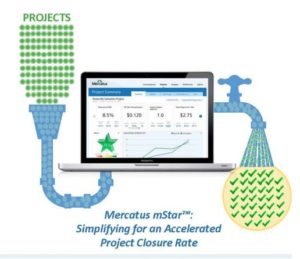By Haresh Patel, CEO of Mercatus
If you are a commercial solar project investor, you know the routine. You aren’t closing enough projects. You don’t have enough new projects entering the funnel and the ones you do have aren’t moving through fast enough. Everyone has their own reason why projects aren’t closing. Engineering says your finance department isn’t modeling the cash flows fast enough. Project development says engineering is getting the yields wrong. Everyone says development needs to source better projects. The whole process devolves into a scrum of finger-pointing and blame-shifting.
The default solution is to simply add more projects into the funnel. After all, project closure delays are the cost of doing business, right? If you have more projects in the pipeline, the delays in closure won’t seem that bad. The problem is that quality new projects don’t grow on trees. So you take the only action that makes sense. You hit the trade show circuit to source more projects. You add channel partners and re-engineer your channel strategies. It’s a lot of hard work that rarely pays off in any meaningful way.
The lack of new projects is only perception. There are plenty of quality projects available and chances are they exist in your funnel. The delays in closure of these projects aren’t just the normal cost of doing the business; rather, they’re indicative of problems in your process. If you’re like most other IPPs, you’re process was probably developed ad hoc as you grew, with various process components developed for individual tasks, but never as part of a holistic strategy.
Ask yourself:

- Do you have the information readily available to make fast and informed decisions when they’re needed?
- Do you have the data and metrics available to hold your teams accountable and drive accuracy, collaboration, and deal completion?
- Can you and your team react to project changes fluidly and in real-time?
If you answered no to any of those questions, your process is likely costing you money. Your process’s problems probably manifest themselves in the form of inaccurate project information, disorganized data centers, or slow-to-respond financial teams. While it may seem like those issues are harmless, they’re actually costing you money.
Poor processes cost companies of your size 0.5 percent in deal closures every year. That may not seem like much, but it adds up when the problem is compounded over time. Let’s assume 0.5 percent deal closure cost equates to 50 projects next year that don’t get done because of inefficiency and distraction, which lead to a declining market share and stagnant or shrinking footprint.
Those 50 deals equal $10M less that’s deployed to the market and $850k less in revenue. The next year, the process is repeated, so you now have $20M less that’s been deployed and $1.7M in revenue. We could repeat the calculation over five, 10, or even 15 years, but you probably get the idea of how devastating the cost could be.
The solution isn’t shoving more projects through a broken process. Rather, the solution is fixing the process itself. There are plenty of tools like ERP and CRM software that proclaim to by process fixers. However, those are only tools, not comprehensive solutions.
The true solution to your broken process is a holistic process realignment that allows your teams to communicate more quickly with reliable data and accurate information. When you have that kind of system in place, you’ll see projects close more quickly, which will in turn alleviate the urgent need to find more new projects.

